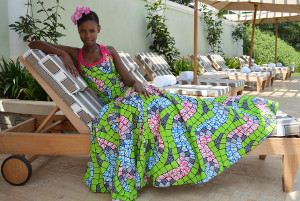African fashion with a Swedish touch
Swedish entrepreneur Cecilia Östman has always had a passion for fashion. After graduating from the Fashion Institute of Technology in New York she worked with international labels including Ralph Lauren.
But Östman says although enjoying being employed, like most designers she aspired to have her own brand someday. Her two sisters and mother had always talked about starting a family business in the industry, but never really got round to doing it.
In 2010, when her 30-year old sister Helena died after an eight month battle with pancreatic cancer, Cecilia and the family were motivated to venture into business in her memory.
And two years ago she teamed up with her sister Annika and their mother Anne to establish Njema Helena, a Kenyan fashion house that makes women’s dresses using African fabrics.
The family chose to start the business in Kenya where Helena had worked as an adult before being diagnosed with cancer. The Östman sisters had spent part of their formative years in Kenya when their family moved here in 1988, and returned for many visits.
Using African fabric
Njema Helena targets expatriates and middle-income women. The dresses sell for between Ksh.7,000 (about US$79) and Ksh. 15,000 ($169). The company also has a following in America and in Scandinavian countries where Cecilia says “the market is really good”.
She explains: “Part of our niche is using the traditional African fabric. A lot of people find us because they are looking for something made out of kitenge.”
“Many outfits made out of the fabric have been quite traditional looking, and what the regular modern woman wouldn’t want to wear. I have been working with it for years and always wanted to find something worthy of the fabric.”
Outside of Kenya, Njema Helena is stocked in stores in the US, Sweden, the UK, Italy and South Africa.
“In Sweden, especially where I come from, people buy our dresses like crazy,” says Anne. “When I go there I organise sales events and in three hours sell 60 dresses. And this is in a small town in the south of Sweden.
“It is a success because we make fitted dresses from beautiful African fabric, with good designs and great quality.”
Anne explains that Njema Helena has also attracted clients because it does not “make fashion”.
“We make dresses for women. We don’t make fashion. We are not fixated on green being the colour for this season and yellow for the next. We don’t focus on trends.
“We make fashionable dresses that make our clients look their best. And we like items that are classic and timeless,” she says.
Managing the business remotely
Njema Helena is seeking to grow its presence in stores across the globe but there are no plans to open its own outlets partly because the Östman’s do not live in Kenya full-time.
“The logistics would be too much of a headache. It is also a huge expense and a big risk,” says Cecilia.
As the head designer at Helena Njema, Cecilia spends part of her time in London, while her mother splits her time between Sweden and Kenya.
She notes that running a business in a country they don’t live in full-time can make things harder. However, frequent travels and constant communication with their local team makes management easier.
“When I worked in New York my employer’s production was done exclusively in the Far East and in China. We never went there. We would send photos back and forth and we used a courier company to send stuff,” she recalls.
“I really think in this global world with the internet and modern communication tools, you don’t have to be everywhere,” adds Anne. “We have business meetings on Skype and all the staff are on Facebook so we talk constantly. If they want to ask something about the dresses they take photographs which are sent via WhatsApp, and Cecilia replies in minutes.
“New technologies have made business easier globally. You can actually have a company in a country that you don’t live in full-time.”
‘A big push for African designs’
One of the biggest challenges Njema Helena faces is difficulties in accessing the fabric which it sources from West Africa. “It is very hard to find the fabric. We only get limited quantities,” says Cecilia.
The designer adds that doing business in Africa is “complicated” but “not more complicated than doing it anywhere else”.
“We often think that Africa is so different, but it isn’t. It is all about how you relate to things. If you don’t know how to relate to the place you are in, you will have great difficulties,” Anne adds.
“I really think people should come here and not be afraid of investing in Africa. It has its problems, but there must be problems everywhere else.”
According to Cecilia, there is “a big push for African designs” globally, however Africa-based designers need to deliver high quality to be able to compete with better known brands in foreign markets.
“People have not always demanded quality from things made in Africa. I don’t think there has been pressure that if you don’t produce the right quality you will not get paid. People have tended to accept less than good quality,” says Cecilia.
“But ‘Made in Africa’ is not enough. The product now has to be good. People always complain that China is taking over all opportunities… but if things are not of good quality and expensive, then it doesn’t make sense to do it here. The standards just have to be high.
“If you are not willing to run with the big boys you are going to get trampled,” she warns.


